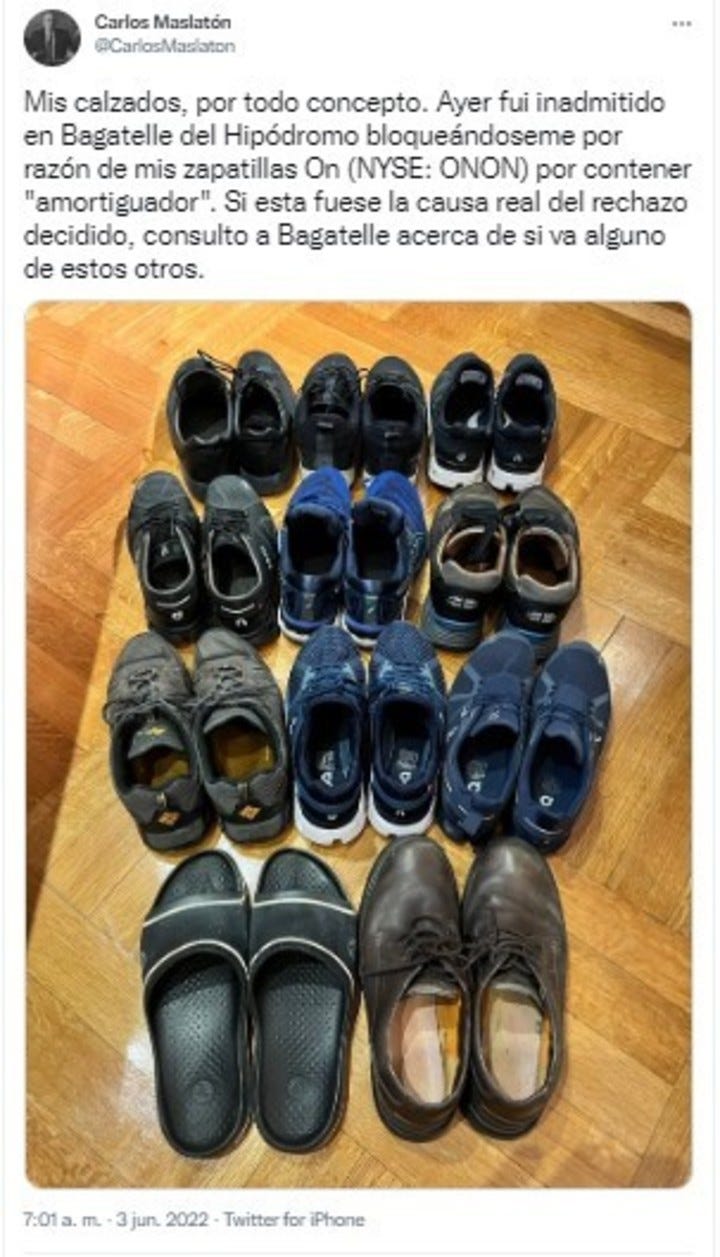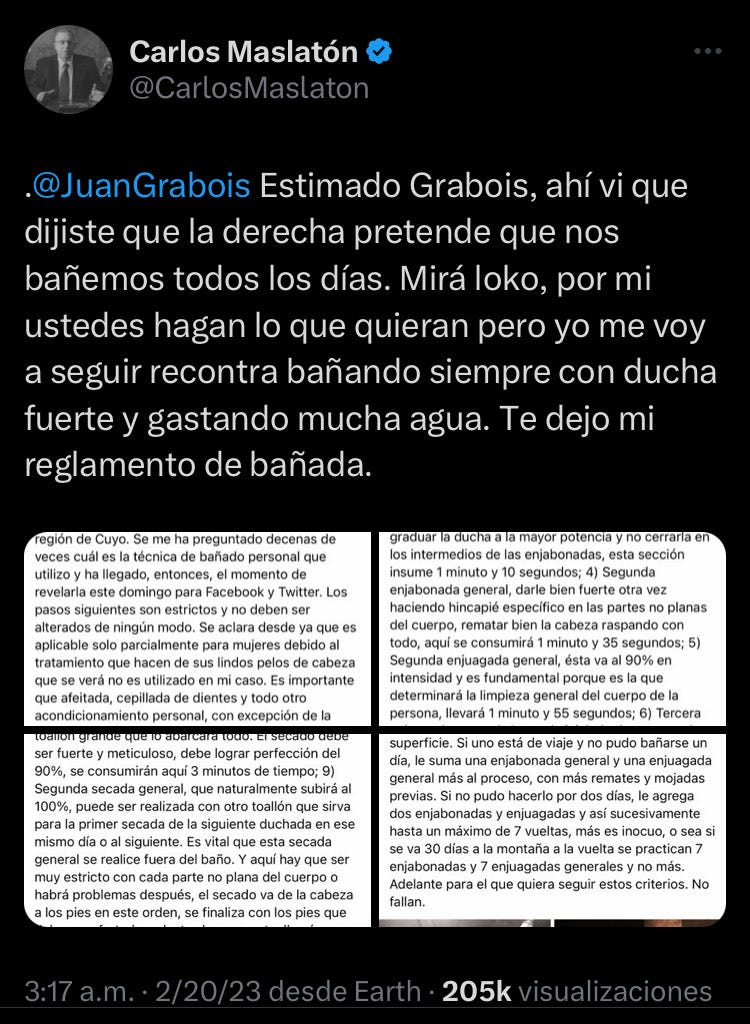Note: Since the vast majority of sources used in this entry are social media postings —— and given its light-hearted nature, I will be much more relaxed in my citation practices than typically. All posts cited will be either shown or linked to. For the benefit of non-Spanish speakers they will be captioned with English translation. All translations by author.
Although I am not particularly proud of Part I of the AMIA series in retrospect, I have been hard at work planning out and writing later entries, which you will get to read soon. I don’t have anything going on this summer other than taking classes, and since those have proved extremely manageable my never-ending problem of having too much understimulating downtime has once again become acute. Aside from my non-fractures pursuits, the vast corpus of AMIA-related theories has proven a decent way of staying occupied (and refreshing my Spanish). But making my way through those heavy materials and analyzing them, is challenging work for which my enthusiasm tends to vary day-to-day. The current entry, by contrast, is not the result of a long-term research task but of one of those periodic fascinations that I just have to write about in order to focus on anything else. Although related to the general themes of this publication it also breaks with past entries in being about something very funny.
When Twitter became unusable last weekend as a result of Elon Musk’s desire to paywall the site (seemingly out of pure spite and humorlessness), I and many other posters were annoyed in the extreme. Given that Musk’s “Twitter Blue” scheme has hemorrhaged the site enormous amounts of ad revenue, it is not a cash-grab so much as an attempt to force users to behave sycophantically towards him personally. So subscribers to it generally showered Musk’s decision with saccharine praise even though it obviously makes the site worse for everyone overall. The imposition of “read limits” would have killed posting as such if the policy hadn’t been surreptitiously reversed following backlash. Again, Twitter Blue followers are philistines who do not really derive any fun from posting, so this was not a consideration for any among their ranks save one. That lone hero was one Carlos Maslatón:
I retweeted this post (ironically of course) because Maslatón’s extremely somber and formal tone was pretty funny, and because he himself is an amusing character in the vein of a Json or Gunther Fehlinger. Maslatón later followed up this protest against Musk with even more stirring and powerful words of dissent:
Carlos Maslatón is a longtime right-libertarian political activist who later (as so many do) used Twitter as a springboard to the second act of his career, becoming an online “financial analyst” who aggressively promotes Bitcoin to young Argentines. Arguably Maslatón is second only to El Salvador’s president Nayib Bukele as a Latin American Bitcoin influencer. Maslatón’s prolific use of Twitter and TikTok has won him a fanbase of young, economically insecure, middle-class Argentines who see his extreme proposals as a miracle solution to the country’s woes. This demographic was largely responsible for the early high poll numbers of supposed “Argentine Bolsonaro” Javier Milei, whose star seems to now be fading as the far more boring yet equally scary Patricia Bullrich eats his lunch. Maslatón, for his part, ran for the nomination of Milei’s coalition La Libertad Avanza and then had a severe falling-out with the latter man when he lost. Maslatón now refers to Milei as a “disaster” and “banana [republic] dictator.” He is also now an outspoken critic of Milei’s proposal to dollarize the Argentine economy, a policy which Maslatón himself advocated up until recently.
Since I live in the United States and and don’t watch Argentine television (or television at all), this was the extent of my awareness of Carlos Maslatón until spending most of yesterday night reading his posts. That, and one other thing. In June 2022 Maslatón made novelty headlines across Spanish-language media for his public feud with a restaurant in the ritzy Palermo neighborhood of Buenos Aires. This establishment, Bagatelle, was review-bombed by Maslatón fans after it refused to seat him because he violated their dress code by wearing sneakers:


As can be seen above, Maslatón is quite passionate about shoes and has a sneaker collection akin to that of a twelve year-old Kanye fan. However, his footwear true love seems to be Crocs, of which he may well be the only connoiseur on Earth:

There are innumerable other posts about Crocs, but you get the idea. As it implies, Maslatón is highly preoccupied with showers and baths:

The shower routine became a popular meme among the Maslatón fanbase, but is something that their hero treats with deadly seriousness. Maslatón has talked in interviews about his showing habits, and even wrote down his shower routine in detail — and tried to make sure left-wing insurgent candidate Juan Grabois saw it:

I will not be translating the actual text of the shower manifesto in full, given that it would at least double the length of this entry. But Maslatón’s shower obsession is reminiscent of one of the most hilarious Donald Trump quotes of all time:
“We have a situation where we’re looking very strongly at sinks and showers and other elements of bathrooms where you turn the faucet on – and in areas where there’s tremendous amounts of water, where the water rushes out to sea because you could never handle it, and you don’t get any water, you turn on the faucet and you don’t get any water. They take a shower and water comes dripping out. Just dripping out, very quietly dripping out. People are flushing toilets 10 times, 15 times, as opposed to once.”
And for American readers, I do think the Trump analogy is a helpful way to look at Maslatón. Like Trump, he is impossible not to find entertaining and is very funny, both unintentionally and not. Unlike Trump, Maslatón is far removed from any kind of real power and thus is pretty non-threatening even with his extreme politics, which allows him to actually occupy the role of a lovable eccentric. He is also… well, simply much weirder. But weird in a neurotic, amusing, Argentine kind of way rather than in the hateful, angry American way that Trump is. I said Maslatón isn’t actually an important figure just now, but that’s only partially true. It is true that Maslatón is politically fairly irrelevant, but I wouldn’t be writing this if he were simply an interesting Twitter freak. Maslatón isn’t powerful like Trump, but like the latter man he is famous. Famous in the specific sense of being on TV. Constantly on TV. In the run-up to this year’s election cycle Maslatón has become a ubiquitous presence on panel discussion and news shows from across the political spectrum. This in itself is unusual, since Argentine media is extraordinarily toxic even by American standards. Although the main center-left newspaper, Pagina12, puts up respectable clicks and subscription numbers, it is beaten in both by the hard-right La Nación. The latter paper is considered the media organ of the Argentine rural elite and has a history of apologism for the 1976-1983 military dictatorship. And both are dwarfed by the Clarín media conglomerate, which puts out Argentina’s most-read newspaper in addition to owning a plurality of the country’s TV channels, film studios, radio stations, and regional papers. Clarín’s mildly center-right slant became far more intense and ugly under CFK, due to a series of personal feuds between her and its owner (López Levy, 2017: 32-33). Its editorial mission since has been to demonize kirchernismo to the maximum degree conceivable and then some. The broader dynamics of Argentine polarization were explored a bit more in Part I of the ongoing AMIA series. But for, our present purposes the takeaway is that the opposing camps in Argentine political media fraternize somewhat less than the Hatfields and McCoys.
Which is what takes Maslatón beyond simple goofiness into actually being sort of likeable. Although Maslatón most often appears on Clarín-affiliated programs, his increasing popularity has also applied to the Peronist media space:
This photo was taken immediately after Maslatón’s appearance on the program Duro De Domar (DDD), hosted by Argentina’s towering center-left journalist Pablo Duggan. Duggan found Maslatón and his antics exasperating, but CFK had a very different assessment:
“I love Maslatón, I don’t agree with him on anything, but I love him … I love Maslatón, I love him, I had a lot of fun.”
For his part, Maslatón offered:
“She can combine capitalist development with Peronist social justice: there is no one who can interpret it like her, I lament that she can’t run because of proscription or personal issues.”
The point isn’t really that Maslatón is some champion of bridging divides (a saccharine archetype of which US cable news never tires). It’s more that he likes to have fun on TV, and doesn’t take it too seriously. Consider the origins of the ‘proceda’ (‘proceed’) meme with which this entry started:
“When they were killing [1955-1958 anti-Peronist military ruler] General Aramburu, the [left-wing Peronist militant] Montoneros set up a people’s trial. One of the Montoneros says ‘I am going to have to kill you, General.’ Aramburu says ‘proceed,’ and the term comes from this … One time, ten years ago, I was on a program with [Gustavo] ‘Gato’ Sylvestre and they put me with people on the left, who sometimes become excessively irritated with me. So they began to threaten me, but on that subject of human rights I have almost no difference with them. I have no problem with threats, say whatever you want. So I said to them on television ‘proceed,’ and I gestured into the air. I got the term ‘proceed’ from there and I use it regularly.”
Maslatón‘s politics are the obviously mostly the standard Friedman-Hayek dogma, his ideology features a lot of idiosyncrasies. Maslatón is definitely more likable for lacking the slavish adoration of the United States so characteristic of Southern Cone libertarians:

His excoriation of wealthy countries in the Global North sounds a bit more Arghiri Emmanuel than Hayek:

Maslatón is a supporter of Russia’s anti-Western special military operation in Ukraine. This position is sometimes associated with the right in Europe. But it is never the case in Latin America given that the right there associates Russia with their bogeyman, Venezuela. Maslatón traveled to Russia last year, prompting his right-wing detractors to come up with the following mantra:
Borón refers to the prominent Argentine Marxist and anti-imperialist scholar Atilio Borón. It’s nice to think that the worst people in Argentina are right about something for once.
Bandung libertarianism! Less bizarre, but perhaps more illustrative, is Maslatón’s endorsement of moderate Peronist Sergio Massa in the upcoming elections. Is this because of a principled libertarian stand against the repressive law-and-order platform of Massa’s likely opponent, Patricia Bullrich? Maybe, but probably not entirely. I think it’s more about Maslatón’s project, as he gets more and more famous, to simply be friends with everyone. Milei loathes him, but Milei voters get a kick out of watching Maslatón own the anti-shower Marxists online. CFK finds him buffoonish, but great fun to have around. Argentina is a country famous for cattle and beef, and so the rather fanciful title of this article is meant to play on Maslatón’s often inadvertent hilarity and that. But ‘lolcow’ conjures up the image of a person who is themselves being mocked when if anything Maslatón’s very existence is more a joke at the expense of Argentine political media.
I remember an ancient episode of Chapo where Matt proposed that Donald Trump be made some sort of national mascot for the United States. Trump is obviously a perfect embodiment of the darkest aspects of the American national character: nativism, greed, gluttony and anti-intellectualism. I think Maslatón is a good choice for a national mascot of Argentina, something which television seems to be already sort of making him. Neurotic yet laid-back, with odd and intense beliefs about banal parts of everyday life, he embodies the mild weirdness so prevalent in Argentines. And unlike Trump, no one doesn’t find him entertaining.
Appendix:
I couldn’t think of anywhere in the narrative to put this, but Maslatón — who is of Syrian-Jewish descent and holds pro-Israel views — is also seemingly an admirer of Gamal Abdel Nasser.
References:
López Levy, Marcela. Argentina Under the Kirchners: The Legacy of Left Populism. Rugby, Warwickshire, UK: Practical Action Publishing, 2017.







